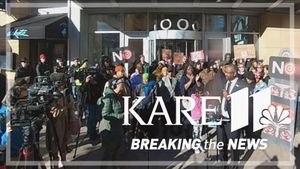Nigel Farage, the leader of Reform UK, is celebrating significant political momentum as the party experiences notable defections and achieves favorable polling results, igniting discussions about its impact on the traditional two-party system.
Speaking at a recent County Durham Conference, Farage announced the defection of two Conservative councillors to Reform UK, signaling the party's growing appeal. Cathy Hunt and Joe Quinn, both former Conservative members, joined the ranks of Reform UK, emphasizing their disillusionment with the mainstream parties. "We're not putting up with Labour and we're not putting up with the Conservatives anymore," Hunt declared, having previously represented Woodhouse Close as an independent councillor. Quinn echoed her sentiments, stating, "Changing sides is a sign of strength... I believe in Reform, I believe in our leadership and I believe Nigel Farage." With these transitions, Reform now counts three councillors on the Labour-dominated Durham County Council, which has 163 representatives.
The defections arrive at a pivotal moment for Reform UK, as it seeks to expand its influence during the upcoming local elections set for May 1. This follows strong performances in polling, where Reform has reportedly surpassed the Conservatives for the first time across major Westminster voting intention polls. According to various surveys conducted at the end of January, Reform UK polled as high as 27%, with the Conservatives trailing behind at consistently lower figures, indicating the party's increasing traction among voters.
Farage has publicly praised the party’s achievements, stating, "We are just getting started," and highlighting their aim to capitalize on recent electoral successes. He emphasized the importance of local elections, warning Conservative voters, "A vote for the Conservatives will only lead to Prime Minister Sir Keir Starmer holding onto No.10."
Farage's declarations are underscored by the growing fears within Labour about Reform UK's potential to seize seats from their traditional strongholds, especially following reports indicating Labour could lose multiple seats to Farage's party. An analysis by the Hope Not Hate campaign group predicts Reform could win as many as 76 seats if elections were held today, primarily at the expense of Labour, with the party expected to experience significant losses particularly among its Red Wall constituencies.
The Labour Party has acknowledged this newfound threat, with senior figures such as Health Secretary Wes Streeting publicly responding to Farage's rise. Streeting expressed concerns, labeling Farage as someone who poses risks to the NHS and vowing to portray Labour's vision as countering Farage’s agenda. The former shadow cabinet minister emphasized the necessity of differentiators between Labour and Reform, asserting, "The populist right are coming for us, and we need to be serious about beating them."
Through various rallies and communications, Reform UK has positioned itself as the alternative to disillusioned Conservative and Labour voters. Amid this political shift, Zia Yusuf, chairman of Reform UK, noted the party now possesses "all the momentum" and is determined to expand its influence by winning more council seats.
The political debate surrounding the viability and intentions of Reform UK continues to intensify. Some members within the party have adopted aggressive stances, welcoming Labour's anticipated attacks. MP James McMurdock articulated the party's readiness, urging Labour to engage directly, stating, "Bring it on!" Meanwhile, Farage dismissed Labour's new anti-Farage strategies, remarking, "If the Labour Party want to give me free publicity, I look forward to it with relish."
This dynamic situation within UK politics marks what many analysts describe as the beginning of potentially transformative changes. Opinion polls reveal substantial voter fluidity, with indications of new political coalitions forming and traditional party lines blurring.
The shifting allegiances contribute to the emergence of what some analysts are calling a new era of four-party politics. The growing traction of Reform UK appears to be part of broader societal discontent with the conventional political establishment, prompting reassessments of voter priorities based on issues like immigration, the NHS, and economic policies.
Farage's claim of impending political seismic shifts likens his party's rise to Donald Trump's impact on American politics. He boldly asserted during one of his recent rallies, "This is going to be the biggest historical political change this country has ever seen." These statements highlight the urgency Reform UK feels as it seeks to consolidate its support and challenge the status quo effectively.
With local elections forthcoming, political observers are closely monitoring how these developments will translate at the ballot box. Will Reform UK successfully challenge the dominance of the established parties, or will the traditional party structures adapt and hold onto their constituencies? The outcome of the local elections will undoubtedly provide valuable insight as Farage rallies his supporters to effect change within the UK political arena.



